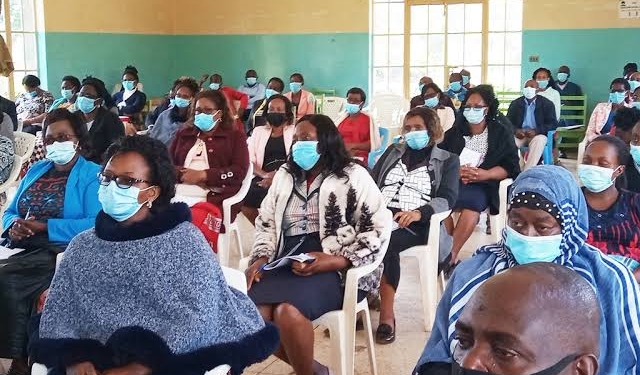Early in the next year, secondary school teachers will begin a 10-month training program on Competency Based Curriculum (CBC).
Targeted participants in the upgrading program, which will start in February of next year, will be at least 110,000 secondary school instructors who will oversee junior secondary schools.
The instructors will receive new training on how to manage junior secondary courses in Grades 7, 8, and 9.
The program is intended for secondary school instructors who will be responsible for instructing students in the junior secondary component of the new curriculum.
George Magoha, the cabinet secretary for education, stated in February of this year that the 10-month training for teachers will help in handling the forthcoming Grade 7 students.
On February 14, Magoha stated that the training will take place between the months of February and December 2023 while speaking at Kapsabet Girls High School in Nandi County.
Learners in the sixth grade will move on to junior secondary schools in 2023. There are three grades in the junior secondary section: 7, 8, and 9.
According to the Teachers Service Commission (TSC), retraining will be required for the 110,000 secondary school teachers in order for them to meet the expectations of the Competency-Based Curriculum (CBC).
According to TSC, in order to prepare for the secondary schools’ double intake in 2023, new learning areas created under the system have made it necessary for all instructors to return to school.
TSC Chief Executive Nancy Macharia writes to Basic Education Principal Secretary Dr. Julius Jwan stating that some new topics need for the hiring and training of teachers.
Pre-technical and pre-vocational education, life skills, agriculture, and health education are some of the subjects that need special emphasis.
Indigenous languages, Kenyan sign language, visual arts, and performing arts are examples of optional topics.
According to Dr. Macharia, all home science and biology instructors would need to undergo retraining in order to manage health education, while social studies teachers must learn how to teach new material on citizenship and physical education teachers must be equipped to handle sports and health.
To accommodate the unique requirements of CBC, the panel suggests changing the teacher education curriculum.
Teachers are currently prepared to teach at least two courses, but the needs of the CBC presently necessitate expanding the teaching disciplines.
Leatherwork, wood technology, hairdressing and beauty treatment, plumbing and ceramics, and welding fabrication are a few of the new disciplines offered under the new system that don’t have teachers.
Mandarin, sports coaches, performing arts, and visual and applied arts are among further examples.
According to Dr. Macharia, instructors around the nation will receive new training in a variety of subject areas that have been modified or embraced new learning philosophies.
Business studies, mathematics, physical sciences, English and literature, Kiswahili, sign language, Arabic, French, German, Agriculture, History, CRE, and building construction are among the subjects covered.
Other subjects include home economics, aviation, electricity, and metal technology, as well as Islamic and Hindu religious education.
The Commission has also said that it will in April of this year train around 60,000 secondary school teachers who are employed by it on the new curriculum.
The instructors will be placed in a short-term program designed to prepare them for teaching important courses in the junior secondary school the following year.
The initial part of the program will focus on the science and physical education instructors who work with the first group of Grade 6 Competency Based Curriculum (CBC) graduates who will take their national exams later this year.
According to a circular issued by TSC CEO Dr. Nancy Macharia, 60,000 instructors would be educated in biology/chemistry, physics/mathematics, and physical education.
Instructors of Physics and Mathematics will be retrained to teach pre-technical and pre-vocational education, while teachers of Biology and Chemistry will be given the skills necessary to manage integrated and health science.
According to the circular, secondary schools need physical education teachers to teach both sports and physical education.
The retooling will take place in April as a five-day in-person training course, with following on-demand learning in the new topic areas.
The primary school teacher up skilling program has already begun, and in July, the candidates will take their final exam and complete their practicum.
When registered teacher candidates’ in-college training is complete in 2022, KNEC will give them the summative test. They will then continue with the practicum.
A subset of trainee teachers at Nakuru Teachers Training College have been taking an electronic exam on the DPTE upgrading since last week as part of a pilot program run by KNEC. Ten colleges were chosen as samples for the experiment.
The updated assessment schedule states that the teacher candidates will be evaluated from July 18 to July 22.
Additionally, beginning in early September, the student instructors will participate in a three-month practicum.
The primary school teacher upgrading program lasts for 4 terms for the DPTE (Diploma Primary Teacher Education) and 5 terms for the DECTE (Diploma Early Childhood Teacher Education).

